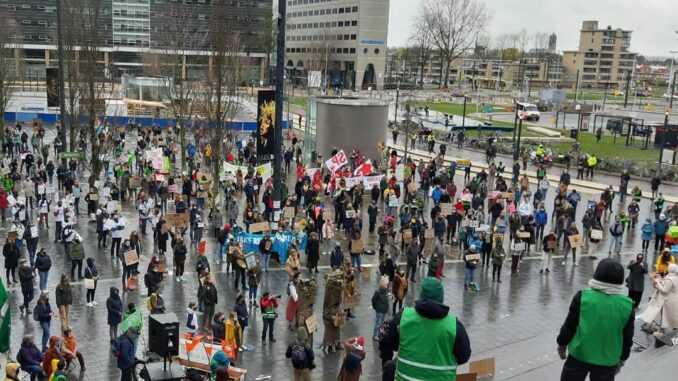
Janneke Prins
On March 14 in 44 cities across the Netherlands people took to the streets to ring the climate alarm. Three days later the general elections were to be held and many climate activists feared they would entail the continuation of the empty green promises of the former government. Although the protests unfortunately had very little impact on the voting behavior and the consequent outcome, the climate movement in this small country has made a huge step forward. The protests formed the largest turn out since last summer, when we saw big static demonstrations of thousands of people in favor of Black Lives Matter in at least ten cities.
As early as summer 2020 a couple of green NGOs such as Friends of the earth (Milieudefensie in Dutch) and Greenpeace took the initiative for this protest. They teamed up with the largest trade union and grassroots organizations such as Extinction Rebellion. Other grassroots had to claim their presence in this national coalition,that would meet every week.
Like the mass protest in March 2019, there was the danger that the mobilization would focus on just one moment in time. Two years ago, in the wake of the international Friday strikes by high school students, it was also these NGOs who led the movement (the Dutch Fridays for Future did not take off until recently). 40.000 people marched in the pouring rain through Amsterdam, but a follow up moment was not planned for. There were national protests after March 2019, nevertheless logistics and the mobilization had to be set up all over again.
It was decided to hold decentralized local protests in order to avoid travelling and jamming together in one major city in these corona times. Grassroots activists showed that they had learned from the single moment actions. So in an early stage, they saw that the networks we could set up in the run up to March 14 might become the base for stronger alliances and actions in future. Every Monday evening collective zoom calls were held by the national coalition to support local coalitions or individuals. The level of experience and understanding of the climate crisis varied amongst the attendees, for new activists these calls were very helpful.
There were a couple of frictions in this national coalition. A discussion centered around absurdly strict Covid regulations that local authorities threatened to maintain. In Rotterdam and The Hague only 200 and 100 people were allowed to attend the protest and in the southern city of Heerlen musicians were not permitted to play. Twenty-two mayors even collectively sent an ‘alarm letter’ to the newspapers in order to frame the climate movement as irresponsible. The bigger NGOs and the trade union quickly wanted to give in, however experienced activists knew how to counter the framing and misuse of public law. Lawyers helped out in the worst cases and eventually the threats by local authorities were merely words.
On the day itself of the decentralized protests, 35.000 people joined – either on the streets,or via an online program for those who cannot join physically and/or for Covid reasons. For this turn out, mainly Extinction Rebellion and Milieudefensie drew in the numbers. Another positive development is that five groups of Fridays for Future were born. We as Internationale Socialisten joined local coalitions in major cities and pushed for a more anticapitalist agenda. For a lot of our members as for many other activists this was a first or early experience with working in a united front.It enabled Extinction Rebellion activists to look further than their own actions and organization.
The most important question now is how to keep the momentum. A lot of people are angered by the election results. It would be a mistake to wait until COP26 for the next moment in time, however this is what some of the NGOs are thinking of. As grassroots organizations we are pushing for three things to solidify.
– One: to connect with rank and file workers in public transport. They are facing cut backs under the pretext of corona measures. We are afraid that the trade union itself will not act in accordance. A solidarity petition is under way, luckily we see more grassroots activists understanding the value of the working class for the climate movement.
– Two: to form a more consolidated national coalition with its own set of demands that prepare for the battle against nuclear power plants amongst other issues. As already stated above, we now know for sure that the parties that won the elections will continue their business as usual.
– Three: to hold another decentralized protest before summer around a lawsuit against the Dutch state. In June it will be five years ago that Urgenda started their climate case against the Dutch government for failing to act properly against the climate crisis. The lawsuit has already been won, but it is a nice reminder. After all, the Dutch government is in the phase of formation in the coming months. We need to keep building the pressure from below.

Be the first to comment